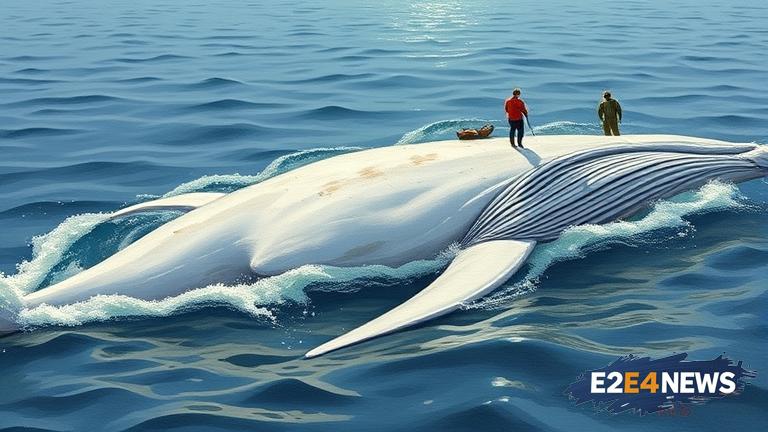A recent incident at the Jersey Shore has ended in tragedy, with a whale that collided with a boat and knocked a woman overboard succumbing to its injuries. The incident occurred when the whale, whose species has not been disclosed, swam into the path of the boat, causing significant damage and throwing a female passenger into the water. Fortunately, the woman was rescued and is receiving medical attention, but the whale was not as fortunate. Despite efforts to save it, the whale died, leaving many to wonder about the circumstances surrounding the collision. The incident has sparked concerns about the increasing number of interactions between humans and marine life, particularly in areas with high boat traffic. As the summer months bring more people to the Jersey Shore, the risk of such encounters increases, highlighting the need for greater awareness and education about marine life and how to interact with it safely. The Jersey Shore, known for its beautiful beaches and vibrant marine ecosystem, is a popular destination for both locals and tourists, but it is also a habitat for many marine species, including whales, dolphins, and seals. While encounters between humans and marine life can be exciting and educational, they can also be dangerous, as this incident has tragically demonstrated. The incident is currently under investigation, with authorities working to determine the cause of the collision and whether any measures could have been taken to prevent it. The death of the whale has also raised questions about the impact of human activity on marine life, particularly in areas with high levels of boat traffic and coastal development. As the investigation continues, many are calling for greater efforts to protect marine life and prevent such incidents in the future. This includes increasing education and awareness about marine life, implementing measures to reduce the risk of collisions, and protecting habitats and ecosystems. The incident has also highlighted the importance of responsible and sustainable tourism, particularly in areas with sensitive ecosystems. As the summer season continues, it is essential that visitors to the Jersey Shore are aware of the potential risks and take steps to minimize their impact on the environment. This includes respecting marine life, following safety guidelines, and supporting conservation efforts. The death of the whale is a tragic reminder of the importance of protecting our oceans and the creatures that call them home. It is a reminder that our actions have consequences and that we must take responsibility for our impact on the environment. The incident has sparked a wider conversation about the need for greater protection and conservation of marine life, particularly in areas with high levels of human activity. As the investigation into the incident continues, many are hoping that it will lead to greater awareness and action to protect marine life and prevent such tragedies in the future. The Jersey Shore community is coming together to support conservation efforts and promote responsible tourism, recognizing the importance of preserving the area’s natural beauty and ecosystem. The incident has also highlighted the need for greater cooperation and collaboration between authorities, conservation groups, and local communities to protect marine life and prevent such incidents. Ultimately, the death of the whale is a tragic reminder of the importance of protecting our oceans and the creatures that call them home, and the need for greater awareness, education, and action to prevent such incidents in the future.





